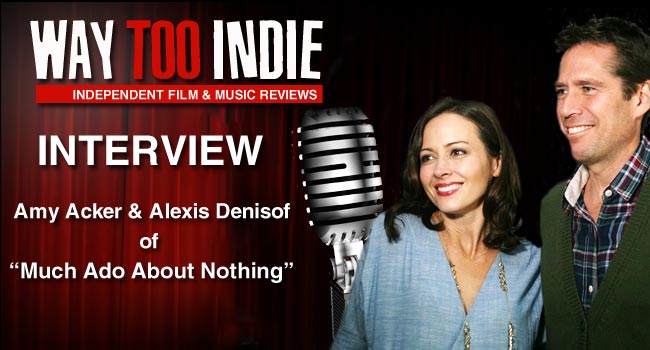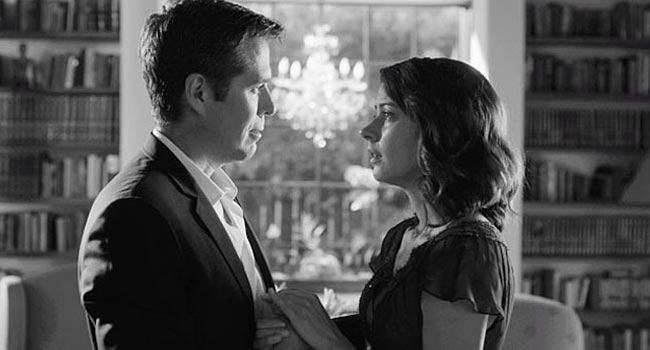Interview: Amy Acker & Alexis Denisof of Much Ado About Nothing

For years Joss Whedon (Buffy the Vampire Slayer, Firefly, The Avengers) has hosted Shakespeare readings at his Los Angeles home with his best friends, who all just happen to be actors he’s worked with on various projects over the years. Over time (and lots of wine), he got the idea to turn these now-not-so-secret shindigs into a film, the result of which is his ultimate passion project—an adaptation of Shakespeare’s timeless comedy, Much Ado About Nothing.
Shot in Whedon’s home to preserve the spirit of the Shakesperean meetings, the film is full of jovial fun, firecracker performances, and a certain verbal virtuosity that both Whedon and Shakespeare share an affinity for. It’s a respectful take on the play because Whedon tells the story in his own voice, not Shakespeare’s. Much Ado About Nothing is timeless, and Whedon appreciates that—he doesn’t inject dialog about iPhones or computers to make it feel ‘modern’. It’s a faithful adaptation, yet also deeply personal.
The stars of the film, Alexis Denisof (Benedick) and Amy Acker (Beatrice), worked with Whedon most famously on Angel, his excellent spin-off of the beloved Buffy the Vampire Slayer. I’m a long-time Whedon fan and absolutely adore Denisof and Acker’s work, so I’m not ashamed to say that I was thoroughly overjoyed to have the opportunity to chat with the duo about Much Ado, working with Whedon, and the benefits of low-budget filmmaking.
WTI: For years Joss’ friends, including you two, have been doing Shakespeare readings at his house just for fun. When he approached you about taking these readings and turning them into a film, was the thought that you wanted to share your little Shakespeare pow-wows with the world, or were you just doing it for fun and playing it by ear from there?
Alexis Denisof: Number 2, for sure. We weren’t even thinking [it would become as big as it is] now. As [filming] was moving along, we all sensed that something special was happening. During shooting Joss was like “Umm…this is looking good. This could be more than the straight-to-DVD or internet release I was thinking it might be.” Amy was saying she thought he was going to shoot it on his iPhone.
Amy Acker: He always said it would be fun to share the readings with people. He thought it would be nice if it was on PBS or something, like a taped reading series in the backyard (laughs). We didn’t know what we were doing, or else we would have probably cried making it! “We’re going to mess up!” (laughs)
AD: Not really knowing [where the project was headed] and not having that much time and having a lot to do, we just put our heads down and got to the business of making it. We didn’t think much about the outcome or get hung up on what it was going to be or how it was going to be received. We just put all our attention on being in the scene, bringing the scene to life, bringing the character to life, and bringing the relationship to life. That’s your favorite place to be as an actor and an artist, to be free of any expectation. There was no failing, you know? If [I wanted] to do push-ups in a scene, I could do push-ups in a scene. If [Amy] wanted to fall down the stairs, she could fall down the stairs. It was sheer joy from beginning to end.

WTI: Joss has his familiar troupe of actors he likes to work with frequently. He draws amazing performances out of you all, and he has a way of making you perform at your very, very best. You two, along with Joss, created one of my favorite television romances of all time as Wesley and Fred on Angel. There’s an intangible quality to a Joss Whedon actor—the way you speak, the way you move, the fine balance of drama and fun. When he looks for new actors to bring into the group, what qualities is he looking for?
AD: Ooh…I don’t think I’ve been asked that before! I guess Joss sees more than meets the eye in a person. He wants to share the hidden talents that an actor might not be getting the opportunity to share, and he sees that, celebrates that. That’s why actors love to work with him. If you’re lucky enough to work with Joss, he’s going to find areas to explore that he might not have even thought of himself if you haven’t been given the opportunity [in the past]. That’s one of the things we’ve loved about him.
AA: You don’t really have to say “I’ve always wanted to do this.” He’ll come to you and be like “I think people should see you do this.” Then, you realize in the back of your head “I was really wanting to be a blue demon!”
AD: That takes a lot of courage from a director and a writer because most directors and writers have a studio breathing down their back and the expectations of delivering something that’s guaranteed to work and deliver. [Studios] don’t want to be told “I want to try this with this actor, I want to find this side of them” or “I want to tell this story in a new way that’s never been told.” [If he went to a studio and said] “Would you like to give me money to shoot Shakespeare in black and white with actors who are good friends that I think would be great for the material, but aren’t necessarily box office [stars].” You know, what studio would put money into that? None of them. But, to Joss, that’s what it’s all about.
AA: I think the common thread of all the actors, especially in this movie, is that everybody is there one hundred percent. There was no one he brought into the project that was not fully invested, whether they had one line or soliloquies running up stairs. Everybody was there to help each other and to help make the movie happen. I think that was important to him.
AD: He sees the spirit of true collaboration, which is that serving the greater good of the project is as important as serving yourself. I think he knew that he could put people into the film that would work together as a team and bring it to life and do whatever was needed. [Much Ado About Nothing] is the definition of a passion project.
WTI: Everybody in the film delivers their lines very well, but you two actually have some great physical comedy moments. How much fun did you have with that?
AD: It was fun. We keep tipping our hat to Joss, but part of why is his love [for] Shakespeare and part of what is in his storytelling is exploring these great, lofty moments of beautiful poignant love or these dreadful tragic moments of self-loathing, but through all of that, there’s always time for a good pratfall or a good moment of slapstick. He’s not afraid to go to all of those places within the same story, and that’s the case with Shakespeare too. Some of it came out of us, the actors, but some of it came out of Joss seeing the scene a particular way. There’s a scene where I do some pretty silly calisthenics, and that came to me very suddenly [when we were setting up the first take.] I just had a moment of clarity with the character and I saw this physical thing that I thought would put a twist on the scene. We kinda tried it, didn’t we?
AA: That was one of the scenes we were practicing on our own while [the rest of the crew] was shooting something inside. He did [the calisthenics thing] and we were talking about it some more and we said “Let’s get Joss and see what he thinks!” (laughs)
AD: He was slightly concerned (laughs).
AA: He came around (laughs).
AD: He did it a little bit out of faith in us.
AA: I think we did one safety take without the crew (laughs).
AD: That was where the low-budget movie was in our favor because, you know, he had to say yes. We were all in this for the fun of it. He was very willing to go almost anywhere with [the project] within certain parameters, because he had a strong vision for the movie and a strong feel he wanted to bring to it. With that safety he gave us he made us incredibly free. I think that’s part of why the movie’s so infused with fun and joviality and so approachable and easy.
